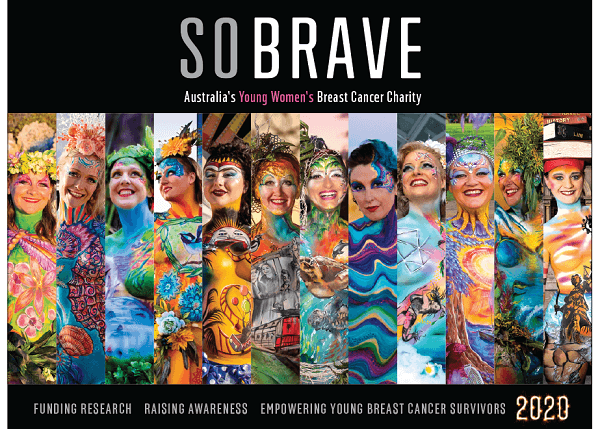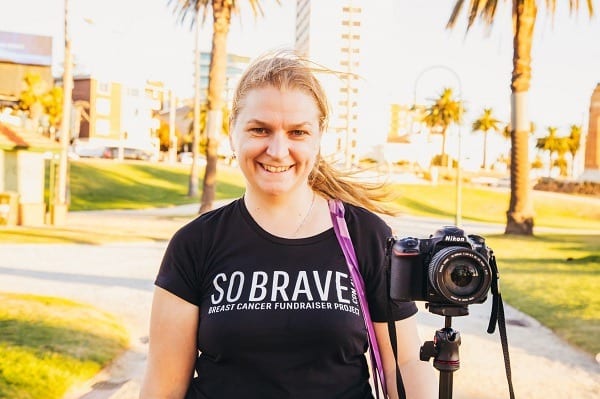Unsurprisingly, the diagnosis turned her personal and professional life upside down.
“I have no family history or genetic predisposition to breast cancer,” Rachelle told Women’s Agenda recently.
“If I hadn’t become aware of what was normal for me while I was breastfeeding my daughter, I might not have realised the lump I found when I was pregnant with my son wasn’t supposed to be there.”
Rachelle endured 18 months of treatment – surgery, chemo, radiation, immunotherapy and hormone therapy. Emotionally, the experience was devastating and it’s something she may never truly get over.
But it also led her onto a path in which she now brings hope and support to other women enduring similar hardships. Rachelle is now the founder and managing director of So Brave, Australia’s young women’s breast cancer charity.
So Brave is in its fourth year and Rachelle has turned her pain into a passion for making sure other young women are #breastaware. As she shares with Women’s Agenda, 900 young women under 40 are diagnosed with breast cancer in Australia each year.
Below, Rachelle shares her story and tells us about the 2020 So Brave fundraising calendar, featuring 12 young Australian women who are breast cancer survivors.
You can purchase a calendar from the So Brave website, by clicking here.
Can you tell us a little about So Brave and the purpose of the calendar?
So Brave is Australia’s young women’s breast cancer charity. We’re in our fourth year and it’s our mission to empower young breast cancer survivors; educate young women across Australia [young women get breast cancer too] and; fund research that better prevents, diagnoses, treats and monitors breast cancer in young women.
Throughout the year, we run support programs for young women, host community events and education programs and manage a research investment program for breast cancer.
We receive no government funding, so to support our core programs each year, So Brave creates a captivating fundraising calendar featuring 12 young Australian women who are breast cancer survivors.

The women are transformed with body art and are photographed for the annual fundraising calendar, and the photos depict the metamorphosis that each young woman has gone through during their body paint photoshoot and breast cancer journey.
Our 2020 So Brave calendar is a colourful, empowering celebration of the women and of their bravery in facing breast cancer and in sharing in this body-painting experience to raise awareness and key funds to fight the disease.
The calendar also features key tips and information about breast care, as well as a snapshot of each young woman’s story.
Our young breast cancer survivors truly are SO BRAVE.
You can purchase a calendar from the So Brave website, by clicking here.
Why did you decide to use the medium of body art for the calendar photographs?
The concept of the So Brave Calendar was all very organically derived. Following my own diagnosis and treatment of breast cancer, I decided on a change of career, and went along to my first business conference – the Artful Business Conference – where I met Wendy Fantasia, a beautiful body paint artist. At the conference dinner, she offered to paint me one day and the idea stuck with me.
The week following the conference, I was staying at an OTIS foundation retreat (for breast cancer survivors and their families) and I remember reading the guest book detailing all these stories of beautiful women and the experiences they had been through. One stuck with me in particular – a young man had brought his family to the retreat following his wife’s death. His story really resonated with me – as a young woman with a breast cancer diagnosis and a young family.
I woke the next morning with a burning desire to tell my husband about my idea – what better way to empower young women following all the trauma of their diagnosis. The loss of important feminine body parts, loss of fertility, loss of hair, body changes, how powerful could a body paint be for these women? I called Wendy to suggest we create a Calendar to fundraise for research and the rest they say is history!
Can you share with us a little about your own story of being diagnosed with breast cancer and the treatment that followed?
I always describe my experience of being diagnosed with breast cancer as devastating; it completely turned my family and professional life upside down. I was diagnosed with breast cancer when I was 32-years old. I had just given birth to my son six weeks earlier and I had a 3-year-old daughter.
I have no family history or genetic predisposition to breast cancer, and if I hadn’t become aware of what was normal for me while I was breastfeeding my daughter, I might not have realised the lump I found when I was pregnant with my son wasn’t supposed to be there.
I endured nearly 18-months of treatment – surgery, chemo, radiation, immunotherapy and hormone therapy, and that’s only the physical side of things. Emotionally was just as torturous. It’s an experience I’ll never truly get over, but it’s made me who I am today.
Like any significant illness, breast cancer causes you to take stock of your life and the direction you’re heading. It can happen at a time in your life when everything is busy, and puts everything into both turmoil and perspective. And for me, I realised how important it was to make sure that other young women realised this isn’t just something that happens once you start getting mammograms.
As a breast cancer survivor, what would you like other women to know about the realities of breast cancer and its impact on things like family, friends and career?
One thing that getting cancer taught me was my need to rely on others, which is hard for young women who are independent and driven like I am. It’s hard to ask for help, but this is the time when you need to and not be afraid to ask.
Rally your supporters around you to help with the kids, or help with the cleaning or the cooking, picking up and dropping off kids, coming with you for treatments and also to take you away from the scariness that is cancer.
You may really be surprised about who will step up and maybe disappointed about people you expected to be there for you but aren’t, try not to take that on board.
There is never going to be a right time to have a cancer diagnosis, but getting this diagnosis when it’s completely unexpected is really hard. The community that So Brave has created over the past four years goes some way to reducing that disconnect and isolation, but I would urge you to connect in with your own community.
I also think it’s incredibly important to realise that no two women and their diagnosis are the same. I wasn’t able to return to work during treatment, but for some women, that ability to have some normalcy in the face of everything happening through treatment is such an anchor.
There also needs to be better recognition and support of people in the workplace going through all kinds of personal challenges, but in particular, better empathy and understanding from managers and HR departments to make better allowances and return to work policies. My experience with my workplace really challenged my concept of what my career should look like, and my treatment gave me space and time to reflect on what I wanted to do going into the future. For me, it meant an entire change of direction, but for others, it may just reinforce how strong their workplaces are and how grateful they are.
And always remember you are stronger than you know!
What else would you like to see recognised & included in discussions of breast cancer awareness?
Overall, I’d like to see more discussions geared towards breast cancer in young women. It happens, in fact it happens to 900 young women under 40 years of age that are diagnosed with breast cancer in Australia each year.
Young women need to be aware of what to do, how to be #breastaware. And then if they are diagnosed, they need to be informed on who to turn to, understand how they will be supported and what the road ahead is going to look like for them. Information and communication are key.
Young women need to be educated that this is just a normal part of life – it needs to be part of the conversation for all women regardless of age. Breast checks and awareness should be encouraged as a life-long, regular practice for all women.



